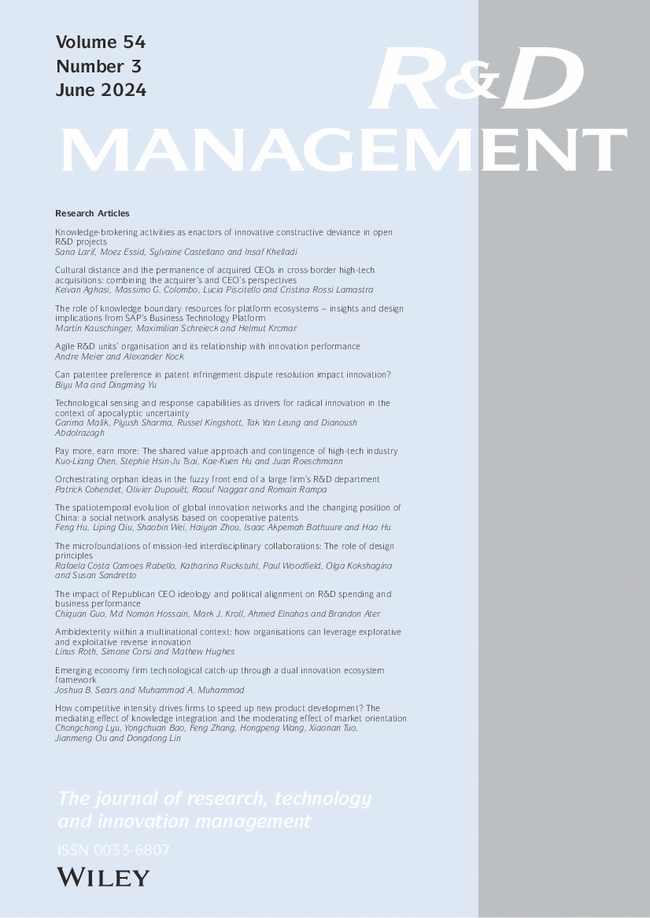知识溢出还是研发合作?了解外部知识对企业创新的作用
IF 5.7
2区 管理学
Q1 BUSINESS
引用次数: 0
摘要
现有研究表明,企业参与研发合作和获取知识溢出效应可以提高创新能力。我们的目标是将这一研究引向一个新的方向,力图回答'与国内外供应商、客户和竞争对手开展研发合作,以及从大学和其他开放来源获取知识溢出效应,如何影响企业的创新?这是我们研究的主要目标。本研究从知识的角度探讨了知识合作与外溢效应,解释了企业决定合作而非获取知识外溢效应如何影响其创新产出和创新倾向。这一框架的理论效用在于阐明了在获取外部知识时,转移给企业的不同类型的知识(基础知识或应用知识)是如何形成影响创新产出的不同机制的。通过分析 2002-2014 年期间英国企业创新调查中有关知识溢出和研发合作的数据,我们证明了在大多数知识组合情况下,知识来源的成本效应超过了知识的互补效应,从而导致企业在研发合作和知识溢出之间做出选择。本研究解释了出现这种模式的原因,并证明这些关系取决于合作程度和知识溢出水平,从而为创新和研发管理领域的研究做出了贡献。本文章由计算机程序翻译,如有差异,请以英文原文为准。
Knowledge spillovers or R&D collaboration? Understanding the role of external knowledge for firm innovation
Extant research has established that firms engage in R&D collaboration and access knowledge spillovers to enhance their innovativeness. We aim to take this conversation in a new direction by seeking to answer the question, ‘How does engagement in R&D collaboration with suppliers, customers, and competitors, both domestically and internationally, as well as access to knowledge spillovers from universities and other open sources, influence a firm's innovation?’ This is the primary goal of our study. The study develops a knowledge‐based view on knowledge collaboration and spillovers, explaining how a firm's decision to collaborate, as opposed to accessing knowledge spillovers, shapes its innovation outputs and propensity to innovate. The theoretical utility of this framework lies in elucidating how the distinct types of knowledge (basic or applied) transferred to a firm when accessing external knowledge create different mechanisms that influence innovation output. By analyzing data on knowledge spillovers and R&D collaboration from the innovation survey of firms in the United Kingdom over the period 2002–2014, we demonstrate that in most instances of knowledge combinations, the cost effect of knowledge sourcing exceeds the complementary effect of knowledge, leading to a firm's choice between R&D collaboration and spillovers. The study contributes to the innovation and R&D management literatures by explaining why this pattern emerges and demonstrating that these relationships are contingent upon the degree of collaboration and the level of knowledge spillovers.
求助全文
通过发布文献求助,成功后即可免费获取论文全文。
去求助
来源期刊

R&D Management
Multiple-
CiteScore
11.30
自引率
9.50%
发文量
0
期刊介绍:
R&D Management journal publishes articles which address the interests of both practising managers and academic researchers in research and development and innovation management. Covering the full range of topics in research, development, design and innovation, and related strategic and human resource issues - from exploratory science to commercial exploitation - articles also examine social, economic and environmental implications.
 求助内容:
求助内容: 应助结果提醒方式:
应助结果提醒方式:


